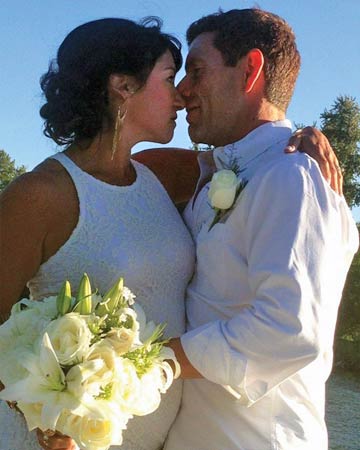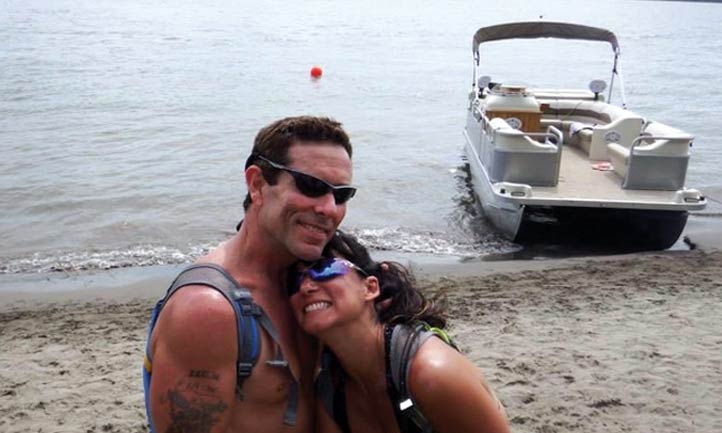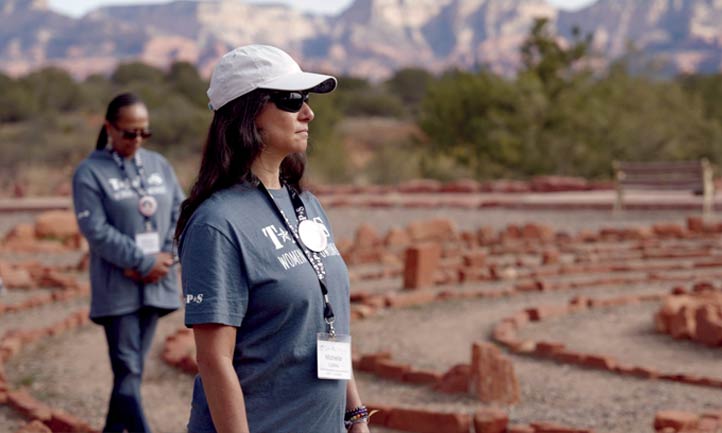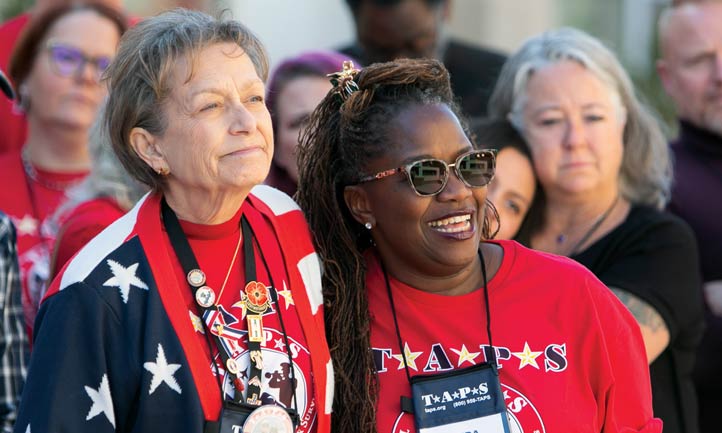Finding Meaning After Loss
Author: Michelle Collins

On the one-year anniversary of my husband Glen’s death by suicide, I spread his ashes off a distinctive rocky outcropping into a small cove in south Maui. I gazed at the water, remembering our time together in this exact spot. Even after 22 years in service, most of which was spent in the SEAL teams, he referred to that little rocky cove as the place he performed “the most heroic act” of his life. He loved entertaining our friends by telling the story of how, in murky churned-up water, he saved me from a turtle that was trying to “kill” me.
We had chosen this spot to snorkel because the surf shop employee guaranteed we would see a turtle here, and my SEAL was on a mission to swim with one.
“Just so you know,” the surfer cautioned as he rented us our snorkel gear, “the surf can get very rough; yesterday a woman drowned in that cove.”
Glen had no problem with this, “As long as we get to swim with a turtle, I’m up for it!” he said, always excited by any challenge — the more dangerous, the better. Meanwhile, I wanted to snorkel anywhere but there.
“You two look young and healthy. I’m sure you’ll be fine,” the surfer reassured us, looking us up and down. Glen was built like a SEAL, not for floating so much as carrying heavy things. While in the teams, he told me he had not been a great swimmer (I barely believed this), but in retirement, he had overcome numerous injuries and improved his swimming skills while training for and completing triathlons — even an Iron Man, so he had become pretty confident in his swimming skills.

As we navigated the gritty green water, getting tossed around by waves, I spotted a turtle and followed it closely to keep it in view. Suddenly, I was startled by a cloud of bubbles from underneath me. Glen appeared and guided me to the surface. As I popped out my snorkel, coughing, I grumped at him, “I was following a turtle. Now I’ve lost it!” Unbeknownst to me, Glen noticed I was headed toward a long, narrow lava tube extending deep into the rocky point. The turtle was likely going in there to rest, but Glen insisted it was plotting to lead me to my doom, and — as his story went — he rescued me just in time.
“I saved your life! That turtle was trying to kill you!” I laughed at him as we slowly made our way back safely to shore.
Exactly two years after that rough, windy day, I sat on the rocks, overlooking that same cove, now perfectly calm and clear, deep blue. As I released his ashes and my tears into the sea, I felt crushed by the weight of so many feelings — anger, sorrow, pain, fear, regret, and even a tiny bit of gratitude and pride in the fact that he chose me to marry him. But one feeling, which was certainly unexpected, was a little bubble of joy from the memory of his proud retellings of how he saved me from that murderous turtle. I smiled as I remembered his warm, loving, boundless energy and infectious laughter. For a brief moment, on this terrible anniversary, I felt joy that I had the chance to share a too-short part of my life with him.
That brief moment of joy was one item on a long list of things that gave his life meaning.
Why is finding meaning important?
When our lives have changed in innumerable ways because of our lost loved ones, just getting through each day is challenging enough. Do we really need to take it further? And how can we find meaning in death, even a heroic one?
According to Victor Frankl, who wrote Man’s Search For Meaning, having meaning in your life is fundamental to persevering through challenging times. Frankl survived a Nazi concentration camp, and his work about this experience is one of the most extreme examples of the lifesaving power of meaning. He attributes his survival partly to his commitment to finishing the manuscript he was working on. The purpose his project provided and his motivation to finish it kept him going through horrific experiences.
How does meaning-making help us, as grievers, to survive & thrive after loss?
While working with over 500 terminally ill patients, Elisabeth Kübler-Ross developed and shared the Five Stages of Dying in her book, On Death and Dying. World-renowned grief expert David Kessler later worked with Elisabeth to transform those stages into the popularly known Five Stages of Grief. The stages include anger, denial, bargaining, depression, and acceptance. These five stages have been discussed and debated for years. Some of them may feel familiar to you, some not. Some you may experience daily, others never. There’s no wrong way or right order; the five stages are just a formula to try to explain what you may experience during the grief process in general.
Years after creating and teaching these stages, David’s oldest son died suddenly. The difficult grief experience that followed inspired him to create a sixth stage of grieving: finding meaning. He describes it as another step in the healing journey. In 2019, he released the book, Finding Meaning: The Sixth Stage of Grief.
Though, David writes, “It’s not necessary to understand why someone died in order to find meaning.” I still struggle with complicated feelings about Glen’s death by suicide. The key for me has been understanding that meaning doesn’t need to be found in his death; instead, I must find it in the life he lived and the life I continue living.
After spreading Glen’s ashes, I cried and cursed in traffic on my drive back to my little rented condo. I was struck by an inner awareness that launched my journey to find meaning and healing. I thought I was having some grief-induced hallucination at the time; I clearly heard a voice say, “You have to write a book about your experiences: Ten Things to Do When Your Husband Dies by Suicide.” I nearly drove off the road in shock.
You would think hearing the voice of God, a spirit, or an angel, I would have been honored and inspired, but my immediate response was, “NO WAY!” I didn’t feel qualified or able to write a book only one year after Glen’s death.
After nearly six years, lots of studies, and dedication to assemble a manuscript that I felt would support others who suffered losses like mine, I answered this call. Writing is a way I found meaning through my loss, but many other ways exist. Try Googling “the gift of grief.” You’ll find so many inspiring stories and possibly even recognize yourself in some of them. New grievers start their journey every day, and you are farther along than many. Simply by being, you are an inspiration to those who follow, giving your life and loss meaning.
About nine months after Glen died, one of his close buddies died by suicide. His wife called me immediately. I was still so deep in my grief that I didn’t think I could say anything to help, but understanding that she needed me, I found the courage to connect with her. During the call, I discovered I didn’t need to say anything to support her. I just needed to be on the other end of the call to listen and reassure her she could survive. What she needed from me — something only I could do for her then — was existence. She needed an example of someone who lived with that same pain longer than she had. She got the support and confirmation she needed just by my existence; my simple hello on the phone reassured her that what she was going through was survivable. That phone call gave my life and my loss meaning. It is the same for you. Whether you know it or not, you support others by being you. As you sit here and read these words, you are giving your life and your loved one’s meaning.
The fact that your loss is further behind you than others makes you an inspiration to those brand new to loss. You don’t have to do anything more than experience living while grieving. Even if you don’t think you’re grieving “right,” you are. Remember, there is no wrong way to grieve, so please be kind to yourself. You may not even know you are supporting someone else. You may mention your loss to someone who needs to hear your story and not even realize you are helping them. You never know who you may inspire or when you may experience new meaning in your life.

By surviving, reading this article, or participating in any of the beautiful offerings we are so fortunate to have from TAPS, you choose new meaning in your life and add meaning to the life of your loved one. The strength it took to get you where you are today, no matter where you are on your journey, inspires others. You are strong, resilient, and important to our community.
Michelle Ann Collins, Surviving Spouse of LT Glen S. Collins, U.S. Navy, Retired, is an author, grief coach, and yoga therapist. She partners with individuals who have suffered grief, injury, or other types of loss as they recover, reclaim their wholeness, and build resilience for life's inevitable challenges. She is a TAPS Peer Mentor and a volunteer grief group moderator for Grief.com. You can find Michelle and her most recent publications at www.inhabitjoy.com.
Photos: Michelle Collins and TAPS Archives.

Find Meaning in Mentorship
What you have learned about grief and yourself in life after loss is valuable to someone new to their own loss. Supporting a fellow survivor as a TAPS Peer Mentor can bring new meaning into your life and help you honor your loved one through service while supporting a grieving heart.
Visit TAPS Peer Mentors to apply.
